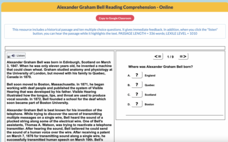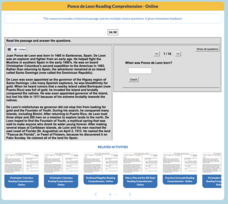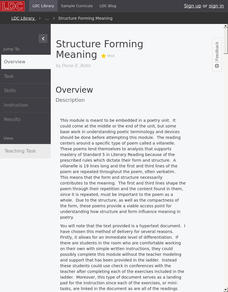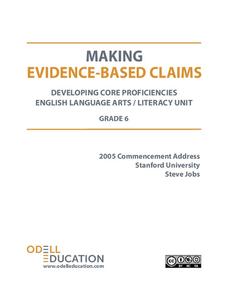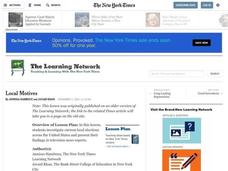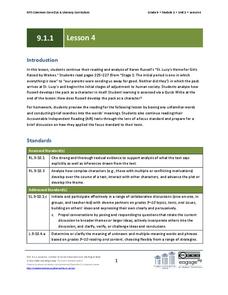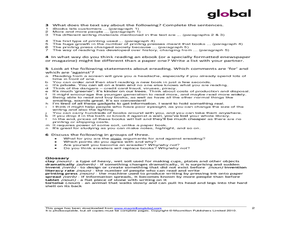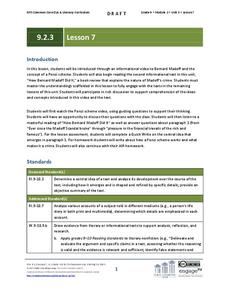EngageNY
Grade 11 ELA Module 2: Unit 2, Lesson 12
Why is it important to make connections across texts? Scholars discover the answer with instructional activity 12 of 14 from the Grade 11 ELA Module 2: Unit 2 series. Pupils analyze the development of ideas in three nonfiction texts,...
National Woman's History Museum
Defying British Rule: Women's Contributions to The American Revolution
Primary and secondary sources are the focus of a lesson that showcases the important role women played during the American Revolution. Pairs review sources and discuss their findings. A close-reading of an informational text leads the...
EngageNY
Grade 9 ELA Module 3, Unit 1, Lesson 6
Are cattle prods beneficial for herding cattle, or do they cause more harm than good? Investigate Temple Grandin's claim about animal behavior with a lesson that focuses on pages 20-23 of the first chapter of her book, Animals in...
Mr. Nussbaum
Alexander Graham Bell
An interactive practice challenges scholars to read an informational text then answer nine questions. The topic of the text is Alexander Graham Bell. Questions are a mix of multiple-choice and fill-in-the-blank.
Mr. Nussbaum
Maryland Colony
Practice reading comprehension skills with an interactive all about the Maryland Colony. Scholars read a short informational text and then answer 10 questions.
Mr. Nussbaum
Ponce de Leon
An informational text about Ponce de Leon tests scholars' reading comprehension skills. Learners read the text and then answer 10 questions. Question types include multiple-choice and fill-in-the-blank.
Civil War Trust
Contrasting the North and South before the War
Learners create a standing cube with four panels that display information on the North and South's economy, geography and climate, society, and means of transportation before the Civil War. Through discussion and reading...
K12 Reader
Classifying Triangles
Bring math and reading informational text together with a reading comprehension lesson. After kids read about isosceles, scalene, and equilateral triangles, they answer five comprehension questions to demonstrate how they can use context...
Literacy Design Collaborative
Structure Forming Meaning
Teach literary lovers how to form opinions about form. Scholars read
informational text about the form used in villanelles. After analyzing
the structure used in the poetry with graphic organizers and gallery
walks, writers create...
Mr. Nussbaum
Christopher Columbus
Scholars use their reading comprehension skills to answer questions about a short informative text regarding Christopher Columbus. A progress report follows eight questions—multiple-choice and fill-in-the-blank.
Mr. Nussbaum
George Washington
An interactive challenges scholars to read an informational text and then answer 10 questions—multiple choice and fill in the blank. A report displays the progress.
K5 Learning
Rhyming Animals
Second graders read an informational text passage on animals, as well as a poem that incorporates rhyming words. Then, 2nd graders answer questions based on what they read.
EngageNY
Grade 9 ELA Module 3, Unit 1, Lesson 8
Have you ever wanted to learn more about a subject after you finished a great book? Guide ninth graders through an inquiry-based research project as they finish the first chapter of Temple Grandin's Animals in Translation. Having...
Odell Education
Making Evidence-Based Claims: Grade 6
In order to make evidence-based claims, one must be able to draw explicit information from text. From here, learners take that information, analyze the text to develop a deeper understanding, and connect with the information in order to...
Louisiana Department of Education
Hatchet
Accompany a novel study of Hatchet by Gary Paulson with a unit consisting of 16 lessons focused on physical and emotional survival. Reading the story along with a variety of informational texts, scholars compare and contrast reading...
Preswick House
Teaching Unit: Invisible Man
Invisible Man is a core text in high school literature classes and one of the most cited works on the AP Literature and Composition exam. Instructors new to using Ralph Ellison's novel and those who have long included it as part of...
Curated OER
Local Motives
Investigate current local elections across the United States with this New York Times reading lesson. Using informational text, middle and high schoolers research local elections and create their own news reports about what they...
EngageNY
End of Unit 2 Assessment, Part One: First Draft of Analysis Essay
How do writers use evidence from literary texts to support analysis and reflection? With instructional activity 17 of 20 from the Grade 8 ELA Module 1, Unit 2 series, learners gather resources to prepare for an end-of-unit assessment....
EngageNY
Grade 9 ELA Module 1, Unit 1, Lesson 4
Connect with the text using helpful annotation strategies. As your class reads the first section of Karen Russell's short story, "St. Lucy's Home for Girls Raised by Wolves," they note important passages that establish character...
EngageNY
Grade 9 ELA Module 3, Unit 1, Lesson 10
Finish your unit on Temple Grandin's Animals in Translation with a two-part written assessment. As ninth graders refer to their notes, annotations, and discussion guides from the first part of the unit, they prepare for a writing prompt...
Curated OER
Global News: The Changing Face of Reading
A current and engaging informational text with some superb scaffolding activities, this six paragraph article discusses the release of the iPad from Apple, eBooks, and the history of reading and writing materials. After reading the...
EngageNY
Grade 9 ELA Module 2, Unit 3, Lesson 13
Using the open-ended discussion questions developed the day before, class members engage in a fishbowl discussion of the three texts that anchor the unit: “True Crime: The Roots of an American Obsession," “How Bernard Madoff Did It,” and...
EngageNY
Grade 9 ELA Module 3, Unit 1, Lesson 2
Autism isn't an illness or a disability. In the first chapter of Animals in Translation, we learn about Temple Grandin's unique ability to understand animals through her experience with autism. Having read pages four through eight for...
EngageNY
Grade 9 ELA Module 2, Unit 3, Lesson 7
After viewing an informational video that introduces Bernard Madoff and the concept of a Ponzi scheme, class members begin reading "How Bernard Madoff Did It," Liaquat Ahamed's New York Times book review that explains Madoff's crime, and...





